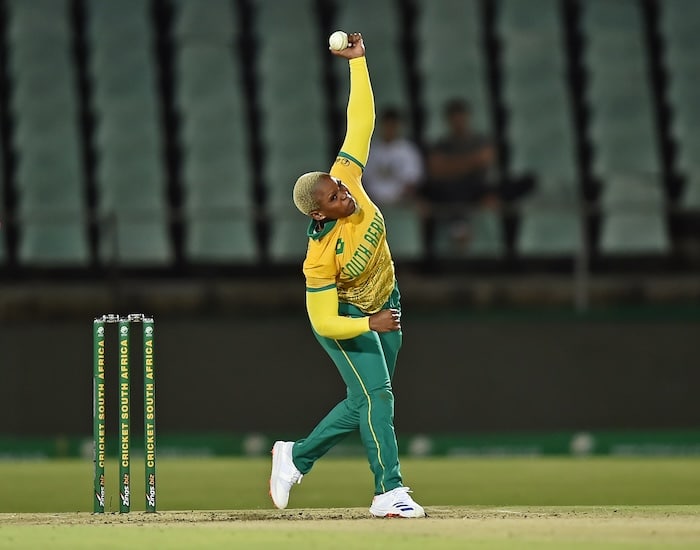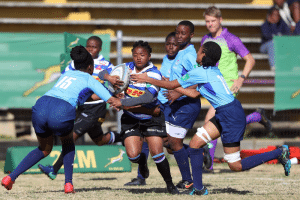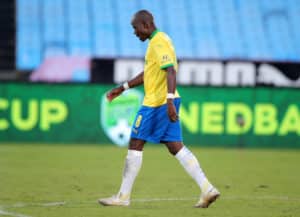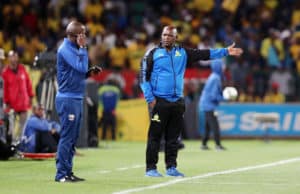Nonkululeko Mlaba has emerged from a tiny town cricket club to be one of the best spin bowlers in the world, writes Nick Said.
South Africa’s women’s side have suffered the heartbreak of back-to-back T20 World Cup final losses, but there is no doubt they are a team on the rise, emerging as one of the leading nations in the game.
They have several world-class players, but spinner Nonkululeko Mlaba’s rapid rise marks her out as a key individual for the team.
The 24-year-old made her international debut in 2019 and it is fair to say it took some time to find her feet. She did not take wickets in any of her first six T20 internationals.
But since mid-2022, we have seen an explosion of her talent in the shortest format, taking 43 wickets at an average of 21.02 and with a career economy rate of a little over six.
Those are some excellent numbers. She was a stunner in last December’s one-off test against England, finishing with match figures of 10/157 and leaving some of the top batters in the world perplexed with her guile and skill.
She was the second highest wickettaker at the 2024 T20 World Cup with 12 scalps, behind only New Zealand’s Melinda Kerr (15).
As of February, this year she was the highest ranked South African bowler in T20s at number 15 in the world, ahead of the phenomenal Marizanne Kapp.
At school in Ntuzuma in KwaZuluNatal, Mlaba enjoyed singing and dancing, and cricket was viewed as a “white person’s sport”.
She was introduced to the game at the age of 14 at the Lindelani Cricket Club, where she went to watch her sister play, simply as something to do on the weekends.
The same club has produced fellow internationals Nondumiso Shangase and Ayanda Hlubi.
It was a slow start, though she began playing as a fast bowler before f inding spinning was more her game.
“In my club, we only had one spinner and one left-arm pacer. My coach (Sandile Hlongwa) decided to move me to spin so there would be a right-left spin combination. It wasn’t too hard. I had to fine-tune some technique, but I naturally got the turn,” Mlaba said.
Though the game came naturally to her, a competitive edge and hard graft did not, according to Hlongwa.
“I won’t lie, she wasn’t very competitive at age-group level, and she was very lazy,” Hlongwa told Daily Maverick.
“It was only in Matric when she realised that she was about to leave the township programme system that she had to pull up her socks. So that’s when she started working hard.
“This served her well because not long after, as she was done writing her Matric exams, she was called up to the Cricket South Africa Academy. And that’s when it all just blossomed for her.”
She was quickly earmarked as a player with talent and made her international debut in India in September 2019, a baptism of fire if ever there was one.
But South Africa, with several good seam options, were desperate to find a spinner.
“It felt like a movie or a dream. I was so nervous. It was so loud that I couldn’t even hear my teammates talking to me,” Mlaba said.
She says her story should serve as an inspiration to others to believe that anything is possible … with the right support and dedication.
“Nothing beats support, motivation and belief,” Mlaba was quoted by BBC.
“Cricket is not as big in our country as rugby or football. In my township, I see a lot of talented boys but some don’t become successful because of the mentality that it’s because they are from the township.
“I would say don’t look at where you’re coming from, it’s not about that. If you’re putting in the work, working harder, and working towards your goal, you will always succeed.”
Mlaba’s improvement as a cricketer has been a lot down to her own dedication, but she has also benefited from expert coaching in recent times. At the last T20 World Cup, that included working with former Proteas spinner Paul Adams.
“Nothing much has really changed, but me and him (Adams) have been working especially on consistency, that’s something that I’ve been lacking as well,” Mlaba said at the time.
“He also helped me trust my arm pull because he really liked my arm pull. That (has) worked for me and that’s something that we’ve been working on and changing of pace.
“I’ve gained a lot of experience, played a lot of games and I also watch a lot of cricket, so I learned from the best. I feel like I’m trusted (in) my role in the team. Now I have that strong mentality when I’m going to the field: ‘Come, you got this’. Like every time, I’m just focused.
“Before I used to, and I still do, get nervous, but now it’s in a good way. I always want the challenge, I’m always hungry for the challenge. That’s what has changed.”
Mlaba has also praised the group of players in a younger Proteas set-up that has seen several old heads retire of late.
“The nice thing is that we are a bunch of youngsters, so we are very playful. Sometimes we don’t really take things seriously, even though they’re serious, but we try not to put too much pressure on ourselves,” she said.
“Our mentality is just out of this world. We are very strong, and we’re just fighting for each other. I just feel like now we’re together, we are a unit.” It still sometimes amazes her to think of what she has achieved in the game, and she hopes to be an inspiration to a new generation.
“I didn’t go to a big school where I’d get to see people of other races. I went to school in the township,” she says.
“For me, as a township girl … cricket was more for white people. For me to get to where I am motivating people and helping them see that anything is possible [is great].”





